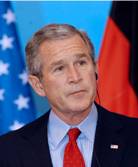George W Bush leaves world stage with a "goodbye"
 Washington - It was a farewell without fanfares, tears or dollops of praise. Instead, US President George W Bush ended his last press conference after an international summit with a simple "goodbye."
Washington - It was a farewell without fanfares, tears or dollops of praise. Instead, US President George W Bush ended his last press conference after an international summit with a simple "goodbye."
Everyone present understood: this was no "see you soon." Indeed, this weekend's historic meeting in Washington to come up with solutions to the global financial crisis was simultaneously Bush's last turn on the world stage. All that remains is some wrapping up of loose administrative ends.
True, there is still an Asia-Pacific Economic Cooperation (APEC) summit to attend before his term runs out, but now everything is geared toward waiting for the arrival of the new president, Barack Obama.
Could this have been the way Bush foresaw his swan song? At a crisis summit?
Without a doubt, the farewells were muted. None of the summit participants wanted to make a public show of accolades for Bush. Even French President Nicolas Sarkozy, a self-avowed friend of America, only managed to come up with some lukewarm homages, calling Bush a "fair, loyal partner," even if he was not always an "easy" one.
Those are hardly the words of someone fighting back his tears.
German Chancellor Angela Merkel used similarly veiled terms, saying Bush was "relaxed" and "calm." She said the summit was managed professionally and with attention to detail. Again, no sign of separation anxiety there.
The leader of the free world did not try to hide the fact that this was not a farewell on his preferred terms.
"Those of you who have followed my career know that I'm a free- market person," he said during the press conference. But that statement only highlighted the ironic nature of this crisis he is managing in his last days.
The global financial crisis was not caused by the Taliban or al- Qaeda. Instead, the free markets, which Bush never stopped praising during his eight years in office, are the source of the debacle.
The mess on Wall Street coincides with the waning prestige of the neocons, the conservative coterie around Bush, under whose watch the state and its regulators failed to control the financial crisis.
Indeed, a few weeks ago, before the big investment banks crashed, many of these neocons still considered deregulation to be a magic bullet and oversight akin to a profanity.
But now in Washington, there is little talk of anything but more oversight for financial types. Sarkozy, who is also the current president of the European Union, had it right when he said that former supporters of the Anglo-Saxon model of capitalism had made more concessions in the last few days than could have ever been expected.
Sarkozy spoke as if the financial sector was on the brink of a revolution. However, in reality, there do not seem to be too many earthquakes in store for the existing oversight and regulatory systems.
First, the various finance ministers need to do their homework. The members of the G20 nations agreed that the first concrete steps toward reform need to be agreed upon by the end of March, at which point there will be another high-level meeting. That's when Obama - whom many would have liked to see in the thick of things this past weekend - will step into the mix.
By that point Bush - who gave his country two wars and an ailing economy, earning him the position of least popular US president in recent history according to surveys - will have long since retired to his Texas ranch. He's recently been talking a lot about his love of Texas and his plans for retirement, even mentioning the possibility of writing a book. (dpa)